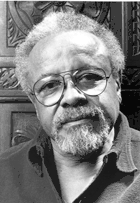Lloyd Richards
Lloyd George Richards (June 29, 1919 – June 29, 2006) was a Canadian-American theatre director, actor, and dean of the Yale School of Drama from 1979 to 1991, and Yale University professor emeritus.
Lloyd Richards | |
|---|---|
 | |
| Born | Lloyd George Richards June 29, 1919 Toronto, Ontario, Canada |
| Died | June 29, 2006 (aged 87) New York City, New York |
| Occupation | Theatre director, actor |
| Years active | 1947–1999 |
| Spouse(s) | Barbara Davenport (1958-2006) |
| Children | Scott Davenport Richards Thomas Richards |
| Awards | Tony Award Best Direction of a Play 1987 Fences Regional Theatre Tony Award 1991 Yale Repertory Theatre Drama Desk Outstanding New Play 1987 Fences 1990 The Piano Lesson National Medal of Arts 1993 Lifetime Achievement |
Biography
Richards was born in Toronto, Ontario, but was raised in Detroit, Michigan. His father, a Jamaican carpenter turned auto-industry worker, died when Richards was nine years old. Soon after, his mother lost her eyesight, he and his brother Allan kept the family together. He later went on to study law at Wayne University where instead he found his way in theatrical arts after a brief break during World War II while serving in the U.S. Army Air Force.
Among Richards' accomplishments are his staging the original production of Lorraine Hansberry's A Raisin in the Sun, debuting on Broadway to standing ovations on 11 March 1959, and in 1984 he introduced August Wilson to Broadway in Ma Rainey's Black Bottom.
As head of the National Playwrights Conference at the Eugene O'Neill Theater Center, he helped develop the careers of August Wilson, Wendy Wasserstein, Christopher Durang, Lee Blessing and David Henry Hwang.
Richards was Dean of Yale School of Drama and Artistic Director of Yale Repertory Theatre, both in New Haven, Connecticut, from 1979 to 1991; he became Professor Emeritus at Yale School of Drama after his retirement.[1]
Richards died of heart failure on his eighty-seventh birthday in New York City.
Richards also taught Moscow Art Theatre acting technique under Paul Mann at the Actor's Workshop in New York alongside Morris Carnovsky.
Awards and nominations
- Awards
- 1987: Drama Desk Award Outstanding New Play - Fences
- 1987: Tony Award Best Direction of a Play - Fences
- 1987: Tony Award Best Play - Fences
- 1990: Drama Desk Award Outstanding New Play - The Piano Lesson
- 1991: Regional Theatre Tony Award - Yale Repertory Theatre
- 1993: National Medal of Arts
- 2002: The Dorothy and Lillian Gish Prize
- Nominations
- 1960: Tony Award Best Direction of a Play - A Raisin in the Sun
- 1981: Tony Award Best Play - A Lesson From Aloes
- 1987: Drama Desk Award Outstanding Director of a Play - Fences
- 1988: Drama Desk Award Outstanding Director of a Play - Joe Turner's Come and Gone
- 1988: Drama Desk Award Outstanding New Play - Joe Turner's Come and Gone
- 1988: Tony Award Best Direction of a Play - Joe Turner's Come and Gone
- 1988: Tony Award Best Play - A Walk in the Woods
- 1988: Tony Award Best Play - Joe Turner's Come and Gone
- 1989: Drama Desk Award Outstanding Revival - Long Day's Journey Into Night
- 1989: Tony Award Best Revival - Ah, Wilderness!
- 1990: Drama Desk Award Outstanding Director of a Play - The Piano Lesson
- 1990: Tony Award Best Direction of a Play - The Piano Lesson
- 1990: Tony Award Best Play - The Piano Lesson
- 1996: Drama Desk Award Outstanding Director of a Play - Seven Guitars
- 1996: Tony Award Best Direction of a Play - Seven Guitars
References
- "Lloyd Richards, Tony-Winning Director Who Helped Give August Wilson a Voice, Is Dead | Playbill". Playbill. Retrieved 2018-06-08.
- Campbell Robertson (30 June 2006). "Lloyd Richards, Theater Director and Cultivator of Playwrights, Is Dead at 87". New York Times. Retrieved 2008-05-28.
- Kenneth Jones (30 June 2006). "Lloyd Richards, Tony-Winning Director Who Helped Give August Wilson a Voice, Is Dead". Playbill. Retrieved 2008-05-28.
External links
- Lloyd Richards Papers James Weldon Johnson Collection in the Yale Collection of American Literature, Beinecke Rare Book and Manuscript Library.
- Lloyd Richards at the Internet Broadway Database

- Lloyd Richards on IMDb
- Lloyd Richards' oral history video excerpts at The National Visionary Leadership Project
- Lloyd Richards Biography and Interview on American Academy of Achievement